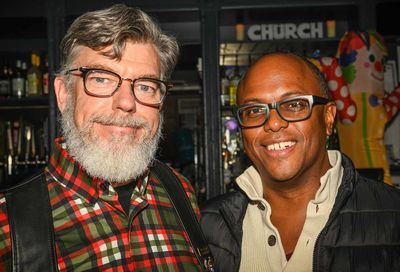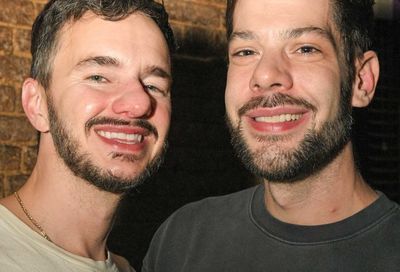The Religious Freedom and Civil Marriage Equality Amendment Act of 2009 passed its second reading during a City Council legislative meeting Tuesday afternoon, Dec. 15, with the majority of the Council supporting the measure, 11-2.
Today’s passage sends Bill 18-482 to Mayor Adrian Fenty, who is expected to sign it. Afterward, the legislation will be subject to 30 legislative days of congressional oversight.
Dialogue before the vote included commentary from all councilmembers in the chamber, including Jim Graham (D-Ward 1), who is gay, speaking about the significance of the vote.
”The actions that we are taking culminate decades of work,” Graham said. ”This is profoundly important for those of us who have seen other days and have lived in other times.”
Councilmember Mary Cheh (D-Ward 3) echoed those sentiments.
”I am thankful as a professor of constitutional law … and as a member of this Council,” she said, ”because I get to cast a vote in favor of equality, fairness and justice, and nothing could feel better than that vote.”
Councilmember Phil Mendelson (D-At Large) said more than 200 churches have expressed support for the measure.
”Although some have said that this legislation restricts religious freedom, I would argue just the opposite, that it expands religious freedom.”
Councilmember David Catania (I-At Large), the gay legislator who introduced the bill, talked about the progress the Council has made on equality issues since he came on board 12 years ago.
”I could never have imagined that we would be here today on this historic occasion,” Catania said, on as he pointed out the 218th anniversary of the ratification of the Bill of Rights.
”I believe the steps that we have taken here, does substantial justice to those first 10 amendments, especially the first one with respect to religious freedom.”
For the two councilmembers who did not vote in favor of the bill, Councilmembers Marion Barry (D-Ward 8) and Yvette M. Alexander (D-Ward 7), Catania said he’s disappointed but sympathetic.
”They are not the typical individuals that you would find casting votes against the GLBT community,” Catania said.
”[Barry] through all of his public service has been a gracious defender of GLBT rights. [Alexander] and her votes on this Council, I can’t think of a single one, in which she has not stood on the side of GLBT community….
”It doesn’t mean I’m not disappointed on a personal level,” Catania added. “They are my friends and they are decent. This is simply a difference of opinion.”
Barry responded to Catania by thanking him for his ”heartfelt words” and reminding the audience of the pro-equality work he has done during the past 38 years.
”Those who will use this as a litmus test for my commitment [are] on the wrong side of history,” he said. ”Look at Marion Barry’s entire record. … I’m going to vote no. I’m not voting no against the GLBT community. I’m voting no against this particular act. … I still stand by this community.”
Alexander thanked the LGBT community for welcoming her with ”open arms” even after she expressed her opposition to marriage equality for same-sex couples.
”When someone can disagree with you and still welcome you, that’s a strong message for everyone,” she said.
























